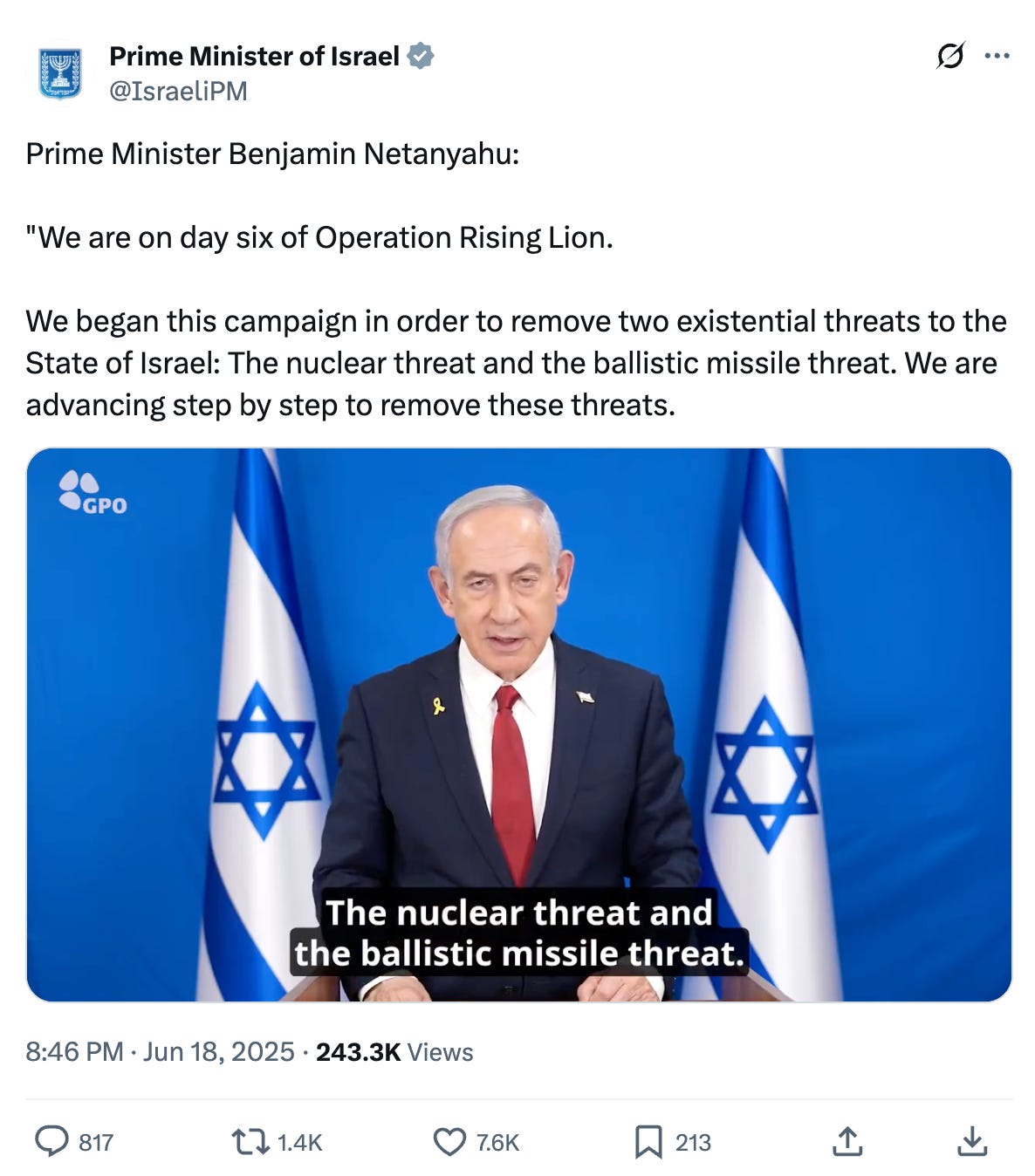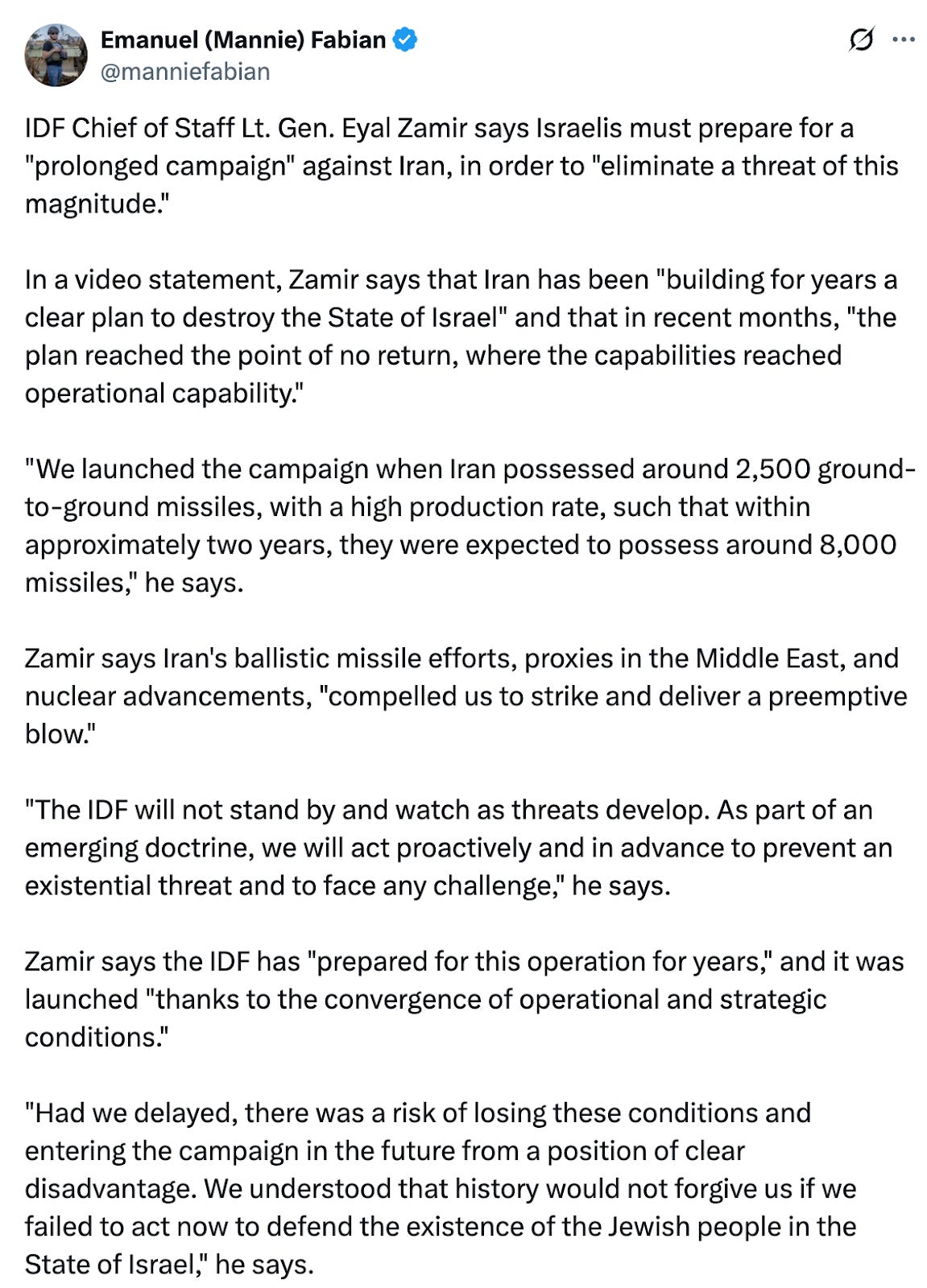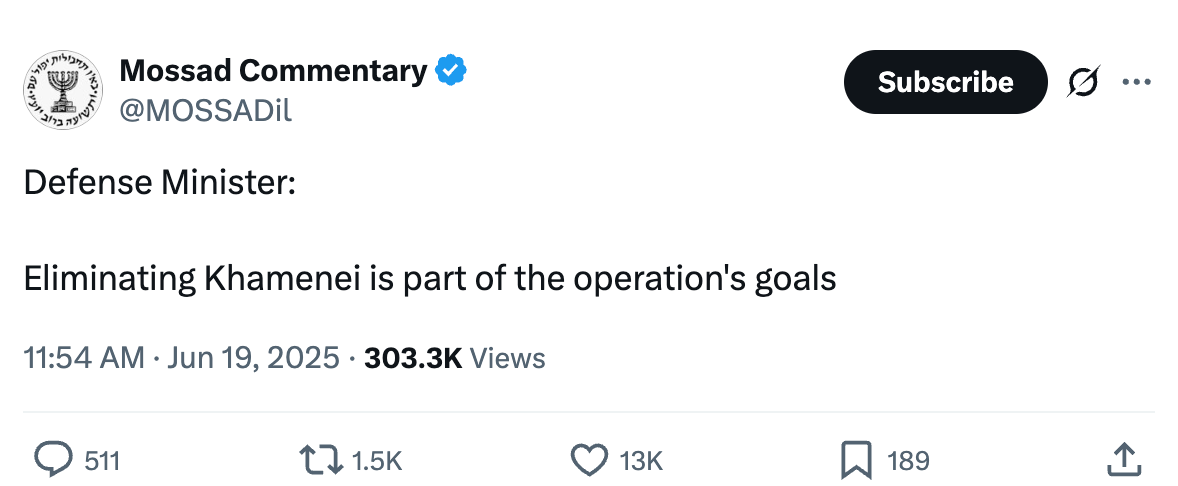Where Will the Israel – Iran War Go from Here?
The answer to this question depends on Israel.
You need two sides to fight a war. Iran probably didn’t want it: It didn’t start it, and it’s been suffering the most. It probably wants vengeance now, but this is the number of missiles Iran has launched in each successive wave:
Iran’s power is plummeting. Its defense capabilities are seriously damaged. Its leaders are being decimated. Its nuclear facilities have just been bombed to ashes. If it can save face, it would probably sign a ceasefire.
If this is true, maybe Iran has a joker up its sleeve, but it had ample reasons to deploy it by now. The fact that it hasn’t suggests the biggest factor in deciding how the war will end between Israel and Iran is: When will Israel stop bombing Iran?
Unclear that will happen soon. Israel is operating nearly at will in the country. Its number of airstrikes barely budged over the first few days:
When will Israel stop? To answer that question, we need to understand Israel’s goals for the war. As we saw in the previous article:
Iran defines itself in opposition to the US and Israel, and has promised the elimination of Israel for 46 years, since the 1979 revolution.
Iran had a nuclear weapons program in the past, and has recently been weeks to months away from developing a nuclear weapon.
Additionally, Iran had thousands of ballistic missiles and was accelerating its production.
Israel’s Prime Minister Netanyahu has said explicitly these are his goals for the war:
Here’s more detail on why:
From this, we can conclude that Israel’s goals are:
Eliminate Iran’s ballistic missiles capabilities and hinder Iran’s progress towards a nuclear bomb as much as possible
Make sure Iran can never get back on track to building either a ballistic missile program or a nuclear one.
Let’s look at each in turn.
1. Israel’s Destruction of Iran’s Ballistic Missiles & Nuclear Weapons Programs
Israel has been bombing Iran heavily.
This is what it looks like:
First, it focused on bringing down Iran’s defenses, but that’s simply for freedom to operate, in order to reach its true goal: take out Iran’s ballistics program and, more importantly, its nuclear program, as advertised by the Iranian regime.
According to Grok, this video was originally posted on June 17th 2025 by the Islamic Republic News Agency (IRNA) in Arabic on X. IRNA is Iran’s official state-run news agency, and was established in 1934. IRNA serves as a primary media outlet for the Iranian government, disseminating news domestically and internationally. Grok could be wrong, though.
With this incentive, Israel has been happily bombing every ballistic missile and nuclear facility it could find in Iran.
Israel had destroyed the Arak nuclear reactor. It had attacked Natanz and destroyed the facilities above ground. Some of its uranium centrifuges had likely broken, but the underground facility had not been destroyed. According to the director-general of the IAEA, all 14,000 centrifuges at the site were likely “severely damaged if not destroyed altogether”.1 But it was probably not enough for Israel to completely stop the Iranian program.
Israel also bombed the Fordow plant, but it hadn’t destroyed it—or maybe even incapacitated it—because it’s under a mountain.
It’s a serious facility, buried 80-90 meters deep.
Or rather, it was. Tonight, the US bombed the hell out of it with this bomb:
The GBU-57 Massive Ordnance Penetrator (MOP) weighs 13 tons, which allows it to reach 60 m below ground before exploding.
This might not be enough to reach the facilities, which is why the US dropped 14 of those on Fordow.
It also bombed the facilities in Natanz and Isfahan.
The US said this is a one-off and it won’t intervene anymore. So is this is? Will Israel pack its stuff and go? I don’t think so.
Another, more recent facility south of Natanz, known as Mt Kolang Gaz La (perhaps even more deeply buried) hasn’t been bombed as far as I know.
Unfortunately, we don’t know where Iran’s 400 kg of enriched uranium is. The IAEA (International Atomic Energy Agency, the UN watchdog) said they couldn’t identify any radiation in the sites, which is actually bad news, because this radiation would not likely be bad for health, but it probably suggests that the US didn’t hit that material; it must be safe somewhere else.
Bombing the hell out of the nuclear facilities is not enough if you can rebuild them. So in addition, Israel has been shooting and bombing nuclear scientists throughout the country, to eliminate as much nuclear knowledge as possible. It claims to have killed at least 14 of them, as well as many of the senior officials who oversaw their work, and the headquarters of the organisation that led Iran’s post-2003 nuclear-related work. It’s doing the same with all sorts of Iranian leadership:
Could Israel stop here? No it can’t.
Say they think “OK enough, let’s pause here.” Iran could easily say “Okay, we don’t care about Fordow. We’ve abandoned it. Now we’re going to take the 2,000 or 3,000 centrifuges that we had built and have moved before your attack and put them someplace you don’t know about and then enrich to 60%. We will also use the uranium we have and that you didn’t bomb.”
Indeed, prediction markets think there’s only a 15% chance that Iran agrees to end uranium enrichment by August. They still believe there’s a 40% chance Iran develops a nuclear bomb by 2030, and a 69% chance by 2041.
Israel can’t just walk away and leave Iran with a pathway to weapon-grade uranium production. That defeats the entire purpose of the operation—especially since now Iran realizes that its conventional defense forces are not enough, and the only way they can defend themselves against Israel in the long term is if they have a nuclear weapon.
So Israel will continue bombing Iran for the foreseeable future, until all other nuclear facilities are identified and destroyed, most Iranian nuclear physicists killed, and enriched uranium is taken care of.2 That’s why prediction markets believe there’s only a 15% chance that Israel stops its operation before July.
Even that would not be enough though, and it’s linked to another scenario: Could Iran surrender and accept a peace treaty where they give up nuclear weapons forever?
2. Can Israel Ensure Iran Never Builds a Nuclear Bomb?
In the previous article, I focused a lot on proving that the elimination of Israel is a core part of how the Iranian government defines itself. It’s a fundamental part of its belief system. It can’t turn away from that now, or all its legitimacy would vanish. So Israel can’t really stop at destroying nuclear facilities.
This might be why prediction markets believe this:
Although markets don’t agree that the end of the Islamic Republic is near:
It’s not just because of the Ayatollah, though:
Not everybody shares these beliefs in Iran, but anti-Zionism is strong enough in the government that Israel might feel it must topple the government to be safe.
The prime minister seems increasingly fixated on toppling Iran’s regime. In a statement addressed to the people of Iran on June 13th he urged them to “stand up” against their rulers. Two days later, in an interview with Fox News, he was asked if regime change was Israel’s goal. “It could certainly be the result, because the Iran regime is very weak,” Mr Netanyahu replied.—The Economist.
The military is acting accordingly:
And if that doesn’t work either, another option is to help the country splinter. If Kurds, Azeris, Balochis, or Arabs decide to break away, like Soviet Republics as the USSR fell, the resulting Iran would be much weaker, much poorer, and in a much more difficult position to build a nuclear bomb.
Takeaways
Israel has spent years planning this war. It has now destroyed a big chunk of Iran’s ballistic and nuclear program, but not completely. So it will continue bombing Iran until these are reduced to dust.
There’s a chance that Israel stops there, but it’s not sure this is what’s going to happen: If the current Iranian government stays in power, it will likely double down on a nuclear program, this time much more secretively. Israel knows this, so it will do everything it can to topple the government or splinter Iran. Since now Israel has the military upper hand, it will continue using this asset until it has assurances that Iran will never be a threat again. This means many more days or weeks of bombings, and potentially operations on the ground.
The question becomes then: How likely is Israel going to succeed at toppling the Iranian government? That’s what we’re going to see in the next premium article.
Apparently, when electric current is cut to the centrifuges, they slowly decelerate. At some points in the process, their rotation speed hits resonance frequencies, which makes them wobble uncontrollably and break. When Iranian operators slowly turned them down in the past, they lacked experience and ⅓ of the centrifuges broke. Imagine what would happen if the centrifuges slow down without any control at all.
The hardest part of uranium enriching is actually going from ore to 5%. Going from 60% to weapon-grade, which is ~90%+, is much easier.















It is pretty clear that Israel and the US are going all in. They have to win now, by any normal understanding of this.
I’m not a fan or Israel or US policy but that is beside the point. Their opportunity is now, and they would be foolish to squander this.
Rightly or wrongly, Iran is toast. I just hope that their leadership goes with it. They are no friends of the Iranian people. And for once, I don’t believe this aggression by Israel and the US will give rise to a major insurgency against the aggressors. This time the Iranian regime may well implode.
Even putting aside attacks by Iran's proxies, Iran directly attacked Israel first in April 2024. Biden then asked Israel to "take a win", but that Israel did not respond then, does not negate the fact of Iran's initiation of direct war